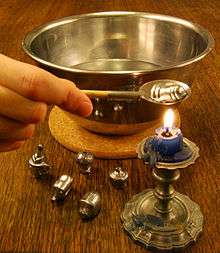Molybdomancy

Molybdomancy (from ancient Greek μόλυβδος - molybdos "lead"[1] + mancy, probably after Greek μολυβδομαντεία - molybdomanteia or French molybdomancie[2]) is a technique of divination using molten metal. Typically molten lead or tin is dropped into water.
Background
.jpg)
The method originates in ancient Greece[3] and it became a common New Year tradition in the Nordic countries and Germany (German: Bleigießen, "lead pouring"), Switzerland and Austria. Classically, tin is melted on a stove and poured into a bucket of cold water. The resulting shape is either directly interpreted as an omen for the future, or is rotated in a candlelight to create shadows, whose shapes are then interpreted. Molten lead is also poured into water in a ritual in Turkey used when people have been affected by the evil eye,[4] and a similar traditional practice is used in Bosnia and Herzegovina.[5]
In Finland, shops sell ladles and small bullions in the shape of a horseshoe for this express purpose. Originally made from tin, now they are made from cheaper low-melting alloys based on lead. The practice is known as uudenvuodentina.[3] The world's largest uudenvuodentina, 41 kilograms (90 lb), was cast by members of the Valko volunteer fire department in Loviisa, Finland, in New Year 2010.[6][7]
The shapes are often interpreted not only literally, but also symbolically: a bubbly surface refers to money, a fragile or broken shape misfortune. Ships refer to travelling, keys to career advancement, a basket to a good mushroom year, and a horse to a new car.[8]
See also
Ceromancy - an easier method to achieve the same goals, using wax rather than metal.
Notes
- ↑ μόλυβδος, Henry George Liddell, Robert Scott, A Greek-English Lexicon, on Perseus
- ↑ Molybdomancy, Oxford Distionaries
- 1 2 "New Year's Tin". tin-mhjk.blogspot.com. Retrieved 28 September 2015.
- ↑ pp. 233 ff., Healing Secular Life: Loss and Devotion in Modern Turkey, Christopher Dole, University of Pennsylvania Press, 2012, ISBN 0812206355.
- ↑ "Traditional Medicine in the Pristine Village of Prokoško Lake on Vranica Mountain, Bosnia and Herzegovina", Broza Šarić-Kundalić et al., Scientia Pharmaceutica 78, #2 (2010 June 30), pp. 275–290, doi:10.3797/scipharm.1003-06.
- ↑ "Maailman suurin uudenvuoden tina valettiin Loviisassa". iltalehti.fi. Retrieved 28 September 2015.
- ↑ Valkon VPK valoi maailman suurimman uudenvuoden tinan 41 kg. YouTube. 1 January 2010. Retrieved 28 September 2015.
- ↑ http://www.rakentaja.fi/artikkelit/723/uudenvuoden_taikoja.htm
References
- de Givry, Grillot (1931). Witchcraft, magic & alchemy. Courier Dover Publications. p. 303. ISBN 0-486-22493-7.
- Cosman, Madeleine Pelner; Jones, Linda Gale. Handbook to life in the medieval world. Infobase Publishing. p. 434. ISBN 0-8160-4887-8.
| Wikimedia Commons has media related to Molybdomancy. |